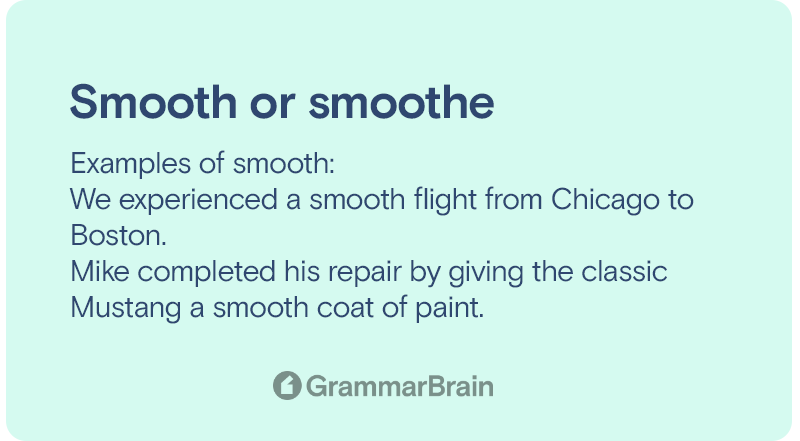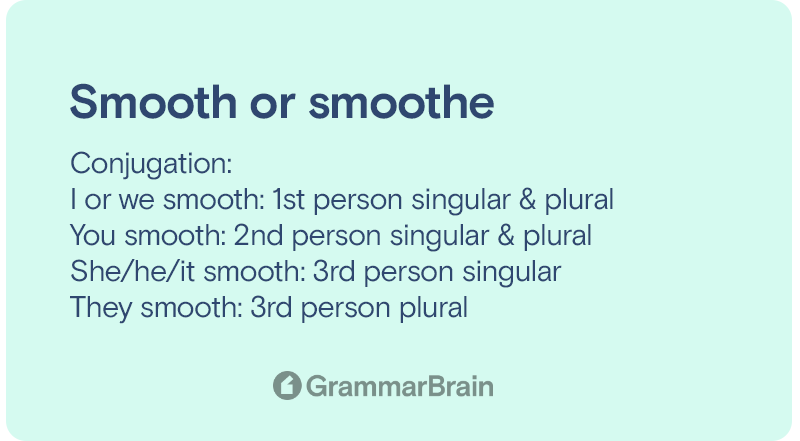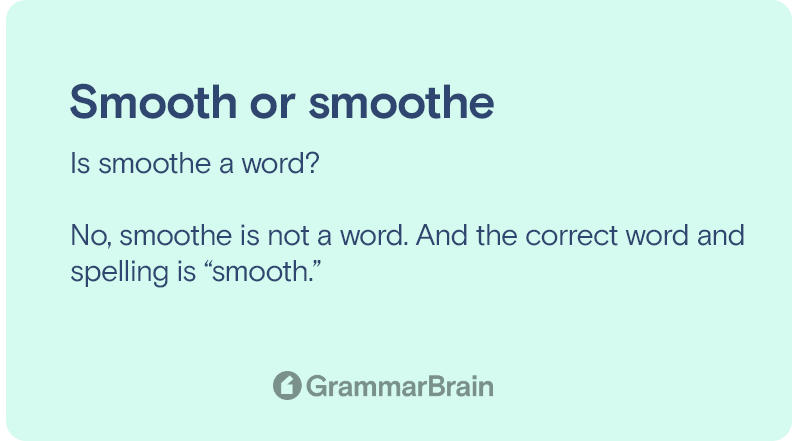Is it smooth or smoothe? With so many words in English spelled numerous ways, it’s no wonder why there’s confusion over words like smooth or smoothe. Smooth seems like it can easily be spelled as smoothe. If soothe and smooth are both correct word forms, then why not smooth and smoothe?
Alas! There isn’t a clear reply to that question, however, in actual use, smooth is the only correct and most commonly accepted word for this.
In the guide below, we are going to compare smooth vs. smoothe. and will also summarize the correct spelling, usage, and example sentences that will demonstrate the proper use of the word smooth.
So, let’s have a look at the definitions of the two words smooth and smoothe.

How to Use Smooth
The word Smooth is typically a universal term that is used as both adjective or a verb.
As adjectives, smooth means completely free of wrinkles or bumps.
For instance:
- We experienced a smooth flight from Chicago to Boston.
- Mike completed his repair by giving the classic Mustang a smooth coat of paint.
As verbs, smooth means to remove wrinkles or bumps.
For instance:
- You need to make a smooth paste of the spices before using them in cooking. This will enhance the taste of your food.
- If you continue smoothly out your skill with regular practice, no one can stop you from achieving success.
Conjugation of the Word Smooth:
- I or we smooth: 1st person singular & plural
- You smooth: 2nd person singular & plural
- She/he/it smooth: 3rd person singular
- They smooth: 3rd person plural
- I/we/he/she/you/they smoothed: is the simple past form
- Smoothing: is the present participle form

When to Use Smoothe
The word smoothe is a common mistake of the adjective and verb form of the word smooth. It’s occasionally posted despite being wrong. This has the spelling smoothing and smoothes as they aren’t proper conjugations of the word smooth’s verb form.
However, the word Smoothen has somehow made its way into a few modern dictionaries and is utilized to mean to become or make smooth. The term is superfluous, and it can give way to further correct usages of the term smooth.
NOTE:
The word Smoothen takes on numerous conjugations in speech and writing, but sounds and looks incorrect and awkward.

Examples of the Word Smooth In Sentences
Here are a few examples of the word smooth. Let’s have a look at the examples below…
- Make a smooth paste to apply to your face.
- To get smooth skin, you need to take proper care of your skin.
- Having smooth tires, your car won’t get a proper grip on the road. So, make sure your tires are not smooth.
- My exercise is finished in one smooth motion.
- Don’t smooth away the tire’s rough edges too much that it invites accidents.
- For a smooth driving experience, you need rough edges on your tire.
In review
So, in the debate on whether smooth or smoothe, ‘Smooth‘ wins the race. This is because smooth is the only correct form of this verb.
When you as an extra -E to the verb and write smoothe, you make a mistake. Since it’s a spelling error, you should always keep in mind that the word form does not have -e at the end.
The word smooth functions as both an adjective and a regular verb. Smooth is typically the proper and the only correct spelling.
So, never write it with an “e” at the end unless you use it in the past tense word form, which is ‘smoothed.’ Altogether avoid writing ‘smoothe’ to describe anything.
FAQs
Does smooth have an E?
No. The correct spelling of smooth has no E in the end. For example, very smooth ride, smooth transition, smooth skin, smooth surface, smooth motion, smooth manner, smooth talker, smooth velvet, etc.
Can you use smooth as a verb?
As a verb, the word smooth means free of wrinkles or bumps.
For instance:
- You need to smooth the frosting properly to make the cake look perfect.
What is the verb for smooth?
The verb smooth is typically a regular verb. Thus, it follows the standard conjugation method for verbs in the English language.
What’s the difference between smooth vs smooth?
The word smooth means free of bumps and wrinkles while smoothe is the misspelling of smooth. Thus, you will always see the use of the word smooth but never the word smoothe.
For example, smooth tire, smooth cheek, smooth disposition, smooth operator, smooth temper, smooth paste, worn smooth, etc.
Inside this article
Fact checked:
Content is rigorously reviewed by a team of qualified and experienced fact checkers. Fact checkers review articles for factual accuracy, relevance, and timeliness. Learn more.
Core lessons
Glossary
- Abstract Noun
- Accusative Case
- Anecdote
- Antonym
- Active Sentence
- Adverb
- Adjective
- Allegory
- Alliteration
- Adjective Clause
- Adjective Phrase
- Ampersand
- Anastrophe
- Adverbial Clause
- Appositive Phrase
- Clause
- Compound Adjective
- Complex Sentence
- Compound Words
- Compound Predicate
- Common Noun
- Comparative Adjective
- Comparative and Superlative
- Compound Noun
- Compound Subject
- Compound Sentence
- Copular Verb
- Collective Noun
- Colloquialism
- Conciseness
- Consonance
- Conditional
- Concrete Noun
- Conjunction
- Conjugation
- Conditional Sentence
- Comma Splice
- Correlative Conjunction
- Coordinating Conjunction
- Coordinate Adjective
- Cumulative Adjective
- Dative Case
- Determiner
- Declarative Sentence
- Declarative Statement
- Direct Object Pronoun
- Direct Object
- Diction
- Diphthong
- Dangling Modifier
- Demonstrative Pronoun
- Demonstrative Adjective
- Direct Characterization
- Definite Article
- Doublespeak
- False Dilemma Fallacy
- Future Perfect Progressive
- Future Simple
- Future Perfect Continuous
- Future Perfect
- First Conditional
- Irregular Adjective
- Irregular Verb
- Imperative Sentence
- Indefinite Article
- Intransitive Verb
- Introductory Phrase
- Indefinite Pronoun
- Indirect Characterization
- Interrogative Sentence
- Intensive Pronoun
- Inanimate Object
- Indefinite Tense
- Infinitive Phrase
- Interjection
- Intensifier
- Infinitive
- Indicative Mood
- Participle
- Parallelism
- Prepositional Phrase
- Past Simple Tense
- Past Continuous Tense
- Past Perfect Tense
- Past Progressive Tense
- Present Simple Tense
- Present Perfect Tense
- Personal Pronoun
- Personification
- Persuasive Writing
- Parallel Structure
- Phrasal Verb
- Predicate Adjective
- Predicate Nominative
- Phonetic Language
- Plural Noun
- Punctuation
- Punctuation Marks
- Preposition
- Preposition of Place
- Parts of Speech
- Possessive Adjective
- Possessive Determiner
- Possessive Case
- Possessive Noun
- Proper Adjective
- Proper Noun
- Present Participle
- Prefix
- Predicate



